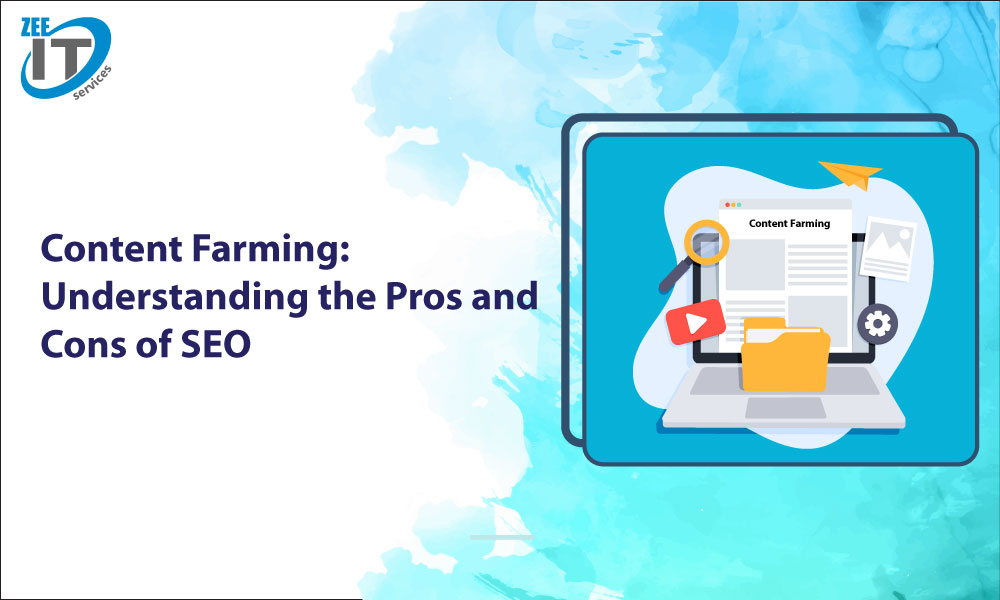Prioritizing quantity over quality is the basis of the activity known as “content farming,” a phrase frequently used to refer to the creation of low-quality content. The main objective of content farming, which is used by many websites, is to increase traffic to their platforms in order to maximize return on investment (ROI). Content farming usually involves producing tutorials, FAQs, and informative articles like “how-to” guides. Let’s examine content farming’s complexities in more detail and assess its applicability to search engine optimization.
What is Content Farming?
In order to drive traffic to a website, content farming is producing large amounts of content, sometimes at the sacrifice of quality. Content farms put an emphasis on quantity in order to increase their online visibility and increase user engagement. This kind of information frequently fulfills a number of purposes:
- Create Backlinks: Content farming is a common technique for raising a website’s search engine rankings by creating backlinks to it. This is accomplished by either adding internal links to the website or by submitting content to external platforms with backlinks to the website.
- Brand awareness: Content farming can also be employed to increase brand awareness and engagement on social media platforms. Websites that provide farming content on many social media platforms want to increase the size of their audience and fortify their brand.
- Boost Conversions: Increasing website traffic and, consequently, the chance of conversions, is another goal of content farming. Websites want to take advantage of prospective leads and convert them into customers or subscribers by increasing the number of visits to their platforms
How Does a Content Farm Work?
Content farms function by utilizing many elements, including trending topics, user preferences, keyword analysis, search behavior trends, and ad-generated revenue. To increase traffic and maximize advertising revenue, these platforms concentrate on detecting popular keywords and creating content that’s compatible with user search queries. Content farms use a variety of keyword research tools, such as Google Trends, Ahrefs, AdWords Keyword Planner, and SemRush, to do this. Furthermore, content farms frequently aim to attract specialized audiences and reduce competition by focusing on long-tail keywords with lower search volumes.
When is a Site Considered a Content Farm?
When a website produces more content in quantity than quality, it is usually referred to as a content farm. This indicates that producing a lot of information is the website’s main objective, frequently at the price of nuance, creativity, and relevancy. In an effort to produce as much material as quickly as possible, content farms commonly use strategies like keyword stuffing, article spinning, and content piracy. These websites frequently create information that is superficial, repetitious, and of little utility to consumers because they lack professional guidance. Additionally, rather than producing content that really meets the requirements of their audience, content farms could concentrate on targeting high-volume, low-competition keywords in order to drive search engine traffic.
The Difference Between Scraper Sites and Content Farms
While both scraper sites and content farms engage in the mass production of content, there are key differences between the two:
Scraper Sites:
Scraper sites primarily rely on automated scripts to “scrape” or copy content from other websites without permission. These sites often republish content from legitimate sources without adding any significant value or originality. Scraper sites may also employ strategies like cloaking to hide their true nature from search engines and users. The primary goal of scraper sites is to generate ad revenue by attracting traffic through stolen content.
Content Farms:
Content farms, on the other hand, may produce original content, but their focus is on quantity rather than quality. These sites can employ freelance writers or content generators to churn out a high volume of articles, blog posts, or other types of content. While some content farms may produce original content, it is often shallow, poorly researched, and lacking in depth or expertise. The primary goal of content farms is to attract search engine traffic and generate ad revenue through the sheer volume of content.
Is Content Farming Good for SEO?
After discussing the various aspects of content farming, it is important to ask whether it is beneficial for search engine optimization. In order to answer this question, let’s look at Google’s perspective on content farming first.
Google’s Perspective Regarding Content Farming
In simple terms, Google rejects content farming techniques. The largest search engine gives preference to websites that regularly provide unique, high-quality, and easily accessible content. Google’s algorithms do not favor content that is considered low-quality or spammy.
In 2011, Google introduced the Panda algorithm in an effort to stop the spread of low-quality content. The Panda algorithm was designed to detect and penalize websites that were involved in spamming tactics, such as content farming. Google aimed to improve user experience and raise the quality of search results by penalizing certain websites.
Google’s Recent Shift:
Google recently implemented a revolutionary strategy with its Search Generative Experience (SGE). Google no longer only refers people to outside information; instead, it now creates mini-articles of its own using an AI model called the Large Language Model (LLM). But there’s a big difference between these articles created by AI and ones written by humans. This Google AI model has several benefits as well as some drawbacks included:
Benefits:
- Enhanced Efficiency: Google can now quickly produce content immediately within search results, improving the user experience and decreasing the need to visit other websites. This is made possible by the deployment of AI-generated content.
- Instant Accessibility: Users don’t have to browse through several links to obtain relevant data, which expedites the search process and gives quick solutions to questions.
Drawbacks:
- Lack of Authority and Expertise: Although AI-generated articles are efficient, they frequently lack the authority and knowledge that come from content created by experts. This weakness could result in poor guidance and out-of-date data, which would damage the authority of the search results.
- User Frustration: Users may become frustrated when AI-generated material is unable to provide correct or pertinent information. This is especially true when users are trying to find current advice or expert perspectives on difficult subjects.
User Experience and Authority:
Google must find a way to balance preserving the authority and quality of its content with helping users. Even if content produced by AI is more efficient, users still choose trustworthy sources that give accurate data and knowledgeable analysis. In order to maintain user confidence and relevance in search results, Google has to strike a careful balance.
Pros and cons of content farming for SEO
Now let’s discuss some fascinating pros and cons of content farming in detail:
Pros of Content Farming for SEO:
- Increased Website Traffic: In the next few years, content farming might result in a large increase in website traffic. Content farms try to draw in people who are looking for information online by regularly releasing new content and focusing on a variety of keywords.
- Increased Search Engine Visibility: Websites with frequent content updates are frequently given preference by search engines. By continuously producing new articles, content farms take advantage of this and can get better search engine rankings as well as more visibility for specific keywords.
- Cost-Effective Strategy: For website owners trying to increase their internet visibility, content farming can be a financially sensible option. Businesses may produce a lot of content without going over budget by adopting automated content-generating technologies or contracting out the writing to freelance writers.
- Backlink Generation: Writing articles with backlinks to the website is a common practice in content farming. This can aid in the development of backlinks, which are essential for raising a website’s search engine rating and bringing in natural visitors.
Cons of Content Farming for SEO:
- Low-Quality Content: The poor quality of content generated is one of the main disadvantages of content farming. A website’s reputation can be harmed by articles that are frequently poorly researched, filled with errors, and lack originality. This can affect both users and search engines.
- Risk of Penalties: Websites that participate in content farming are subject to detection and penalties by search engines such as Google. These penalties can have a significant negative influence on a website’s organic access and vary from a decrease in search ranks to a whole removal from the search index.
- Negative User Experience: Poor user experience based on low-quality content can result in high bounce rates and low engagement metrics. The long-term profitability of content farming as a technique gets reduced when users find irrelevant or thin information, as they are unlikely to return to the website.
- Reduction in Brand Reputation: Providing poor content via content farming can harm a website’s or brand’s reputation. Users can believe the website is unreliable or untrustworthy, which would reduce credibility and brand loyalty.
The Legal & Ethical Concerns Regarding Content Farms
Now lets see content farms raise several legal and ethical concerns, including:
Copyright Infringement:
Content farms may infringe upon the copyrights of other websites by plagiarizing or republishing their content without permission. This can lead to legal action against the content farm for copyright infringement.
Deceptive Practices:
Content farms often employ deceptive tactics to attract search engine traffic, such as keyword stuffing, cloaking, or misleading titles and meta descriptions. These practices can deceive users and harm the credibility of search engine results.
Quality of Information:
Content farms prioritize quantity over quality, leading to the proliferation of low-quality, inaccurate, or outdated information online. This can mislead users and undermine the trustworthiness of online content.
Exploitation of Writers:
Some content farms exploit freelance writers by paying low wages for content production or using exploitative contracts. This can lead to poor working conditions and undermine the livelihoods of freelance writers.
Frequently Asked Questions:
What is content farming?
Content farming is a strategy where websites prioritize quantity over quality in their content production. These websites churn out a large volume of content with the aim of attracting traffic and improving their search engine rankings.
What are the pros of content farming for SEO?
Some potential benefits of content farming for SEO include increased website traffic, enhanced search engine visibility, cost-effective content creation, and potential for generating backlinks.
What are the cons of content farming for SEO?
The drawbacks of content farming for SEO include the production of low-quality content, the risk of penalties from search engines, negative user experience, and potential damage to brand reputation.
How does content farming work?
Content farming typically involves producing a high volume of content targeting various keywords and topics. This content may be created by freelance writers, content generators, or automated tools. The goal is to attract traffic and improve search engine rankings.
Is content farming ethical?
Content farming raises ethical concerns due to its focus on quantity over quality, potential exploitation of writers, and dissemination of low-quality or inaccurate information. Website owners should prioritize producing valuable and original content that serves the needs of their audience.
How does Google view content farming?
Google does not favor content farming practices and has algorithms in place to detect and penalize websites engaged in such tactics. The search engine giant prioritizes high-quality, original content that provides value to users.

